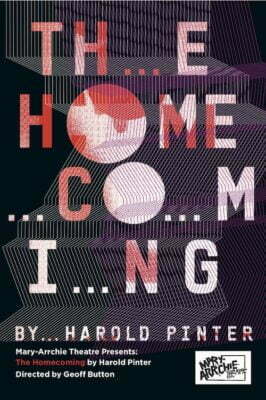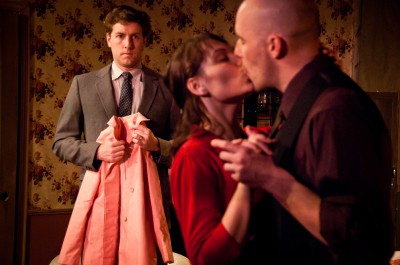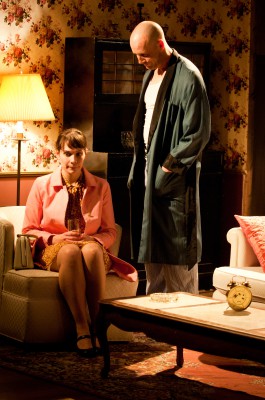The Homecoming
Directed by Geoff Button
Produced by Mary-Arrchie Theatre
At Angel Island, Chicago
In The New Yorker, the critic John Lahr writes: “‘The Homecoming’ changed my life. Before the play, I thought words were just vessels of meaning; after it, I saw them as weapons of defense. Before, I thought theatre was about the spoken; after, I understood the eloquence of the unspoken. The position of a chair, the length of a pause, the choice of a gesture, I realized, could convey volumes” (“Demolition Man”).
Subtle yet sexually provocative drama awaits
Mary-Arrchie Theatre specializes in raw, gritty Chicago style theatre. They take those attitudes toward British playwright Harold Pinter’s 1967 Tony Award-winning (for Best Play), The Homecoming. The trick to successfully mounting a Pinter play is to have your cast master the space between the words and the difficult swift change of meaning with the utterance of a single word or gesture. I must say that director Geoff Button and his excellent cast of six fully understand and embrace Pinter’s play. They deftly navigate the telling silences, pauses and unresponsiveness that fuel Pinter’s deliberately ambiguous work . The play begs the question whose homecoming is it anyway? Teddy’s or Ruth’s? Is she a reincarnation of the long dead Jessie – the family matriarch? Has the family been waiting for her?
We meet a lower class British family ( circa 1964) consisting of four men, all related living and sniping at each other constantly. Using Amanda Sweger’s appropriate set design depicting a worn-out London house with a wall torn out, we find Max (Richard Cotovsky), a retired butcher, and Sam (Jack McCabe), a chauffeur, who are brothers; and two of Max’s three sons, Lenny (Vance Smith), who appears to be a pimp; and Joey (Dereck Garner), a would-be boxer in training who works in demolition. This woman-less and love-less household is ripe with knit-picking arguments as the four struggle to tolerate each other. Early on we realize that there is a hidden rage lurking beneath the surface. We see Lenny (terrific emotionally explosive work from Vance Smith) rage at his father, Max -who himself appears as a dysfunctional man devoid of feelings or empathy. Max rages at his simple-minded brother Sam – know as the best chauffeur in town. Only young Joey is spared revile as he is the family’s hope as a boxer. We wonder what the submerged emotions are about?
We quickly learn the source as Teddy (Luke Hatton) and his wife, Ruth (Michaela Petro) return from America to visit the family. Teddy is now a college professor of philosophy and his wife is a former British model. The sexual tension occurs as Ruth easily manipulates and teases Teddy’s brothers and father. Lead by the outspoken Lenny, the men taunt one another to see who can score with Ruth. Teddy watches and seems unable or unwilling to curb Ruth’s sexual advances. I’ll not say more so as not to spoil the story.
If you ‘tune-in’ to Pinter’s subtly and watch for the nuances, facial gestures and other noon-verbals before and after the spoken word – you’ll become entranced into this compelling tale of lust, loneliness and sexual deprivation. It is a marvelous work of absurdist theatre deftly acted (especially by Vance Smith as Lenny and Michaela Perto as the sexy Ruth). Irony and ambiguity makes this work a master piece of theatre. After seeing this enigmatic play, you’ll be dissecting it for days.
Highly Recommended
Tom Williams
At Angel Island, 735 W. Sheridan, Chicago, IL, call 773-871-0442, tickets $18 – $20 -$22, Thursdays thru Saturdays at 8 pm, Sundays at 7 pm, running time is 2 hours, 10 minutes with intermission, through April 10, 2011



